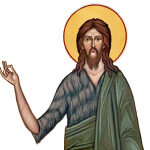Interested in a Service or Event?
All are welcome to attend our services and events. Often those who are new to the Faith choose to attend a Saturday evening vesper service as a way of getting to know Orthodox worship a little bit at a time.
Sunday Matins (Orthros) 8:00 AM
Sunday Divine Liturgy 9:30 AM
Saturday Vespers 6:00 PM
Festal Evening Services 6:30 PM
Festal Divine Liturgy 9:00 AM
All services are in English
The Divine Liturgy is the central service of our Church life. It consists of the proclamation of the Word of God, who has come into our midst, and our reception of the Eucharist. As Christians, we are called to offer up this holy Eucharist (Thanksgiving) in memory of our Lord each and every Sunday, in remembrance of His Passion, death, and Resurrection. The Divine Liturgy is the ‘work for the people’ by God, who offers Himself to us, using us as his laborers. With this Liturgy, we also commemorate the earthly life of the Lord, the life of His Holy Mother, and the great Christians who have gone before us – the Saints, who now dwell with Christ – on the feast days of the Church.
Vespers is our evening service (the name comes from the Latin word for evening), sung at the setting of the Sun and looking towards Christ, the True Light, as the darkness of night begins to overtake us. Following our Jewish forebears, Vespers anticipates the coming day, and the hymns prepare us for the coming feast, whether it be of the Resurrection (on Saturday nights, for the coming Lord’s Day), or on the eves of feasts. Confession is always available after Vespers, and a General Confession service is held after Vespers on the first Saturday of the month. Sometimes, it is combined with Matins (our morning service) to form Vigil. On the eves of Christmas, Theophany, and Annunciation, however, Vigil consists of Compline (the service at the completion of the day) and Matins, because they are proceeded by a Vesperal Liturgy (Vespers + Divine Liturgy) in the afternoon.
A Pannikhida, or Parastas in the regional jargon, is our Memorial Service at which we commemorate the departed. This can be in memory of a specific person, or as a General Pannikhida, where those present offer lists of names for commemoration.
A Moleben is a service of supplication to our Lord, His Mother, or His Saints, asking that they save us and grant us spiritual and physical health. It is customary to bring names of the living for the priest to read during the prayers of a Moleben, just as at a Pannikhida/ Parastas the names of the departed are commemorated. The departed can also be commemorated at a Moleben, in addition to our prayers for them at the Pannikhida. Because a Moleben does not require a choir, it will sometimes replace weekday Vespers.
Compline comes from the word ‘complete’, serving as a prayerful end to the day. It will be added to our schedule during lenten seasons. Confession is always heard afterwards, and thus is as an excellent opportunity to enter more fully into our seasons of repentance.
Matins can be offered in the morning, as was once common here before Sunday Divine Liturgy; it will be offered on some weekdays during lenten seasons, taking around an hour.
Fast Days are shaded on the calendar, on which we are called to struggle to give up animal products and luxurious foods. On certain days, Wine and Oil (i.e., alcohol stronger than beer, and rich foods, such as fatty and sweet food) are permitted, while on others we are permitted to have Fish, Wine, and Oil. Additionally, there are several Strict Fast Days through the year (Weekdays of Lent, Exaltation of the Cross, Christmas Eve, Theophany Eve, and Good Friday) on which we should strive to refrain from eating solid food until sunset. We should remember that these foods are not sinful in themselves, but that fasting is a tool of spiritual exercise given to us by the Church: a tool which teaches us to offer ourselves to God and to control our selfish desires. Just like an athlete who doesn’t practice or exercise, if we fail to struggle and train as spiritual athletes we will fail to perform when it really counts! Even if all we can do is give up a little, we must be like the athlete who begins by lifting the smallest weight or running the slowest mile. We have to struggle to spiritually grow from where we are, taking confidence in the fact that God loves us, and that He knows our frame and our struggle: He will accept any small sacrifice if we do so with sincerity of heart.
Saints are commemorated by the Church on each and every day of the calendar, with some days having dozens of commemorations. The major commemorations are all listed, as well as saints who are significant to our Mother Church of Russia, our national Orthodox Church in America and its diverse people, or are simply popular in modern American Orthodoxy. Others are there simply because the rector wishes that we call them to mind. Those saints in parentheses are not being liturgically commemorated, but are still of significance. They should be brought to mind, even if we are not celebrating them in Church. Consider reading about all these saints on our national website: https://www.oca.org/fs
As is true in many Orthodox churches, meals are an important part of our St. John’s parish life. Parish members contribute to this ministry by signing up throughout the year to provide a hospitable meal after Liturgy.
Orthodox Calendar for the Greater Pittsburgh Area
The Orthodox Calendar for the Greater Pittsburgh Area is provided by the IOCC Pittsburgh Metropolitan Committee.

